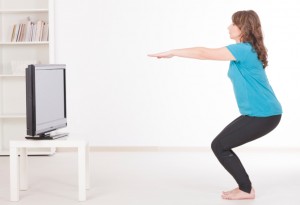
Faculty Member, Sports and Health Sciences Program at American Public University
Over the past several years, “gaming” has entered the fitness arena, with new technology allowing participants to move and become active while playing games. With the growing obesity epidemic and the billion-dollar weight-loss industry as motivation, video game companies have marketed their technology to parents who are worried about children becoming obese (while they play video games) and to a generation of “gamers” who will have the ability to exercise while in their comfort zone in front of their game system.
I have worked with several graduate students who have done research into whether video game systems can help to increase fitness. Of the projects we have completed, here is a short summary of the results.
Exercise Adherence
Will an individual be more likely to adhere to an exercise program with a virtual trainer, or to a face-to-face personal trainer?
In two studies, one using the Kinect for the Xbox and a virtual trainer, and one using the Wii fit, we found no significant difference between traditional training days missed in the gym, days missed with the virtual trainer, and days missed using an at-home exercise plan. Days missed were measured over a 3-month period. The accountability of logging exercise in an app on their phone was another variable tested, and it had a positive effect on adherence.
Caloric Expenditure
Over the course of a typical exercise session, are more calories burned in the gym with a trainer or using a virtual trainer for a workout if the exercises, intensity, duration are kept constant?
This question may seem to have an obvious answer, but we conducted this study to measure calories due to concern about the technology interfering with rest/work ratio. It seemed that there was increased rest time due to having to set-up each exercise on the Wii or Kinect. The results indicated that there was no significant difference in estimated calories burned, based on heart rates achieved and time maintained.
Enjoyment Level of Participants
Does an individual enjoy the virtual trainer more than a real-life trainer?
Subjects of the study reported enjoyment in using the virtual trainer and the real trainer, and although slightly more preferred the real-life trainer, no significant difference was observed.
Convenience
Which method is most convenient?
Almost every person in the group enjoyed the convenience of the virtual trainer. Only individuals in the age group classified as 55 and above reported more convenience with the real trainer and exercise program. We attributed this to the fact that these individuals were attending group exercise prior to the study. They also reported little experience with gaming systems.
Playing Games vs. Traditional Exercise
Are individuals actually exercising or are they playing games that do not burn calories?
A large majority of people who used the Wii Fit logged more time playing games. Not all of these games burned a substantial amount of calories.
Caloric Loss Prediction
Are calories burned accurately portrayed by games?
Caloric expenditure was based off of weight and height, and no heart rate measurement was taken. Almost all of the prediction equations were over-predicting caloric expenditure. This is a huge problem. If people think they are burning more calories than they are, then they will not lose weight. They may even eat more calories than needed.
Exercise Related Injuries
Are the virtual trainers promoting exercises that may injure people due to lack of knowledge?
A large percentage of games are not adhering to the American College of Sports Medicine (ACSM) or National Strength and Conditioning Association (NSCA) standards and guidelines when prescribing exercise. Several games also performed exercises that are considered unsafe by the ACSM.
Virtual Use and Fitness Improvement
Do these games really improve components of fitness?
Do the games work? Yes they do. If you increase activity and actually DO something, you will burn calories. Any method if increasing activity will have a positive impact on your health.
Finding something you will adhere to, and that you enjoy is key. I always say, whatever you do- do something! That’s what matters. Gimmicks do not work. Effort, enjoyment, and seeing improvement are all ingredients to the formula of improved health.
About the Author:
Dr. Kelly Brooks completed her doctoral work at The University of Alabama. As a former college track athlete, Brooks was inspired to research human response to different environmental conditions, and was the first female appointed to environmental laboratory coordinator at the University of Alabama. Brooks went on to teach and research in both Biomechanics and Exercise Physiology at Louisiana Tech University, where she served as Laboratory director and Graduate Coordinator, as well as Louisiana State NSCA director. She is currently in her first year at Texas A&M University Corpus Christi, and conducts research on the development of biomechanical and medical devices, and fitness applications.
Comments are closed.